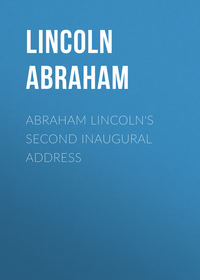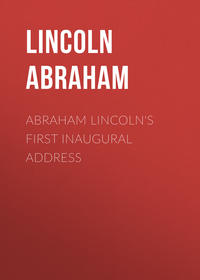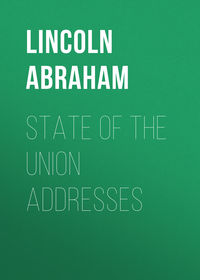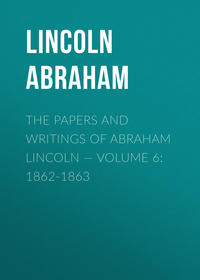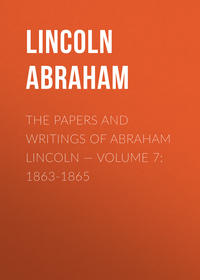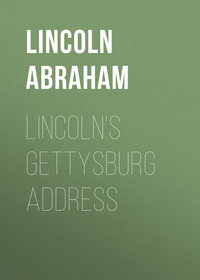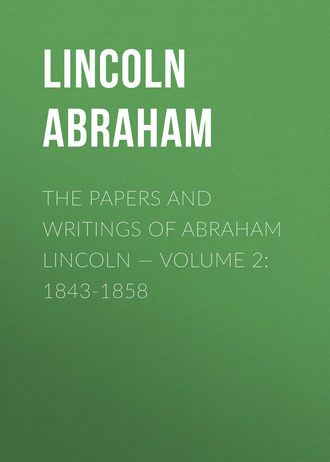 полная версия
полная версияThe Papers And Writings Of Abraham Lincoln — Volume 2: 1843-1858
Excuse this short letter. I have so many to write that I cannot devote much time to any one.
Yours as ever,
A. LINCOLN.
SPEECH IN THE HOUSE OF REPRESENTATIVES,
JUNE 20, 1848In Committee of the Whole on the State of the Union, on the Civil and Diplomatic Appropriation Bill:
Mr. CHAIRMAN: — I wish at all times in no way to practise any fraud upon the House or the committee, and I also desire to do nothing which may be very disagreeable to any of the members. I therefore state in advance that my object in taking the floor is to make a speech on the general subject of internal improvements; and if I am out of order in doing so, I give the chair an opportunity of so deciding, and I will take my seat.
The Chair: I will not undertake to anticipate what the gentleman may say on the subject of internal improvements. He will, therefore, proceed in his remarks, and if any question of order shall be made, the chair will then decide it.
Mr. Lincoln: At an early day of this session the President sent us what may properly be called an internal improvement veto message. The late Democratic convention, which sat at Baltimore, and which nominated General Cass for the Presidency, adopted a set of resolutions, now called the Democratic platform, among which is one in these words:
"That the Constitution does not confer upon the General Government the power to commence and carry on a general system of internal improvements."
General Cass, in his letter accepting the nomination, holds this language:
"I have carefully read the resolutions of the Democratic national convention, laying down the platform of our political faith, and I adhere to them as firmly as I approve them cordially."
These things, taken together, show that the question of internal improvements is now more distinctly made — has become more intense — than at any former period. The veto message and the Baltimore resolution I understand to be, in substance, the same thing; the latter being the more general statement, of which the former is the amplification the bill of particulars. While I know there are many Democrats, on this floor and elsewhere, who disapprove that message, I understand that all who voted for General Cass will thereafter be counted as having approved it, as having indorsed all its doctrines.
I suppose all, or nearly all, the Democrats will vote for him. Many of them will do so not because they like his position on this question, but because they prefer him, being wrong on this, to another whom they consider farther wrong on other questions. In this way the internal improvement Democrats are to be, by a sort of forced consent, carried over and arrayed against themselves on this measure of policy. General Cass, once elected, will not trouble himself to make a constitutional argument, or perhaps any argument at all, when he shall veto a river or harbor bill; he will consider it a sufficient answer to all Democratic murmurs to point to Mr. Polk's message, and to the Democratic platform. This being the case, the question of improvements is verging to a final crisis; and the friends of this policy must now battle, and battle manfully, or surrender all. In this view, humble as I am, I wish to review, and contest as well as I may, the general positions of this veto message. When I say general positions, I mean to exclude from consideration so much as relates to the present embarrassed state of the treasury in consequence of the Mexican War.
Those general positions are: that internal improvements ought not to be made by the General Government — First. Because they would overwhelm the treasury Second. Because, while their burdens would be general, their benefits would be local and partial, involving an obnoxious inequality; and Third. Because they would be unconstitutional. Fourth. Because the States may do enough by the levy and collection of tonnage duties; or if not — Fifth. That the Constitution may be amended. "Do nothing at all, lest you do something wrong," is the sum of these positions is the sum of this message. And this, with the exception of what is said about constitutionality, applying as forcibly to what is said about making improvements by State authority as by the national authority; so that we must abandon the improvements of the country altogether, by any and every authority, or we must resist and repudiate the doctrines of this message. Let us attempt the latter.
The first position is, that a system of internal improvements would overwhelm the treasury. That in such a system there is a tendency to undue expansion, is not to be denied. Such tendency is founded in the nature of the subject. A member of Congress will prefer voting for a bill which contains an appropriation for his district, to voting for one which does not; and when a bill shall be expanded till every district shall be provided for, that it will be too greatly expanded is obvious. But is this any more true in Congress than in a State Legislature? If a member of Congress must have an appropriation for his district, so a member of a Legislature must have one for his county. And if one will overwhelm the national treasury, so the other will overwhelm the State treasury. Go where we will, the difficulty is the same. Allow it to drive us from the halls of Congress, and it will, just as easily, drive us from the State Legislatures. Let us, then, grapple with it, and test its strength. Let us, judging of the future by the past, ascertain whether there may not be, in the discretion of Congress, a sufficient power to limit and restrain this expansive tendency within reasonable and proper bounds. The President himself values the evidence of the past. He tells us that at a certain point of our history more than two hundred millions of dollars had been applied for to make improvements; and this he does to prove that the treasury would be overwhelmed by such a system. Why did he not tell us how much was granted? Would not that have been better evidence? Let us turn to it, and see what it proves. In the message the President tells us that "during the four succeeding years embraced by the administration of President Adams, the power not only to appropriate money, but to apply it, under the direction and authority of the General Government, as well to the construction of roads as to the improvement of harbors and rivers, was fully asserted and exercised." This, then, was the period of greatest enormity. These, if any, must have been the days of the two hundred millions. And how much do you suppose was really expended for improvements during that four years? Two hundred millions? One hundred? Fifty? Ten? Five? No, sir; less than two millions. As shown by authentic documents, the expenditures on improvements during 1825, 1826, 1827, and 1828 amounted to one million eight hundred and seventy-nine thousand six hundred and twenty-seven dollars and one cent. These four years were the period of Mr. Adams's administration, nearly and substantially. This fact shows that when the power to make improvements "was fully asserted and exercised," the Congress did keep within reasonable limits; and what has been done, it seems to me, can be done again.
Now for the second portion of the message — namely, that the burdens of improvements would be general, while their benefits would be local and partial, involving an obnoxious inequality. That there is some degree of truth in this position, I shall not deny. No commercial object of government patronage can be so exclusively general as to not be of some peculiar local advantage. The navy, as I understand it, was established, and is maintained at a great annual expense, partly to be ready for war when war shall come, and partly also, and perhaps chiefly, for the protection of our commerce on the high seas. This latter object is, for all I can see, in principle the same as internal improvements. The driving a pirate from the track of commerce on the broad ocean, and the removing of a snag from its more narrow path in the Mississippi River, cannot, I think, be distinguished in principle. Each is done to save life and property, and for nothing else.
The navy, then, is the most general in its benefits of all this class of objects; and yet even the navy is of some peculiar advantage to Charleston, Baltimore, Philadelphia, New York, and Boston, beyond what it is to the interior towns of Illinois. The next most general object I can think of would be improvements on the Mississippi River and its tributaries. They touch thirteen of our States-Pennsylvania, Virginia, Kentucky, Tennessee, Mississippi, Louisiana, Arkansas, Missouri, Illinois, Indiana, Ohio, Wisconsin, and Iowa. Now I suppose it will not be denied that these thirteen States are a little more interested in improvements on that great river than are the remaining seventeen. These instances of the navy and the Mississippi River show clearly that there is something of local advantage in the most general objects. But the converse is also true. Nothing is so local as to not be of some general benefit. Take, for instance, the Illinois and Michigan Canal. Considered apart from its effects, it is perfectly local. Every inch of it is within the State of Illinois. That canal was first opened for business last April. In a very few days we were all gratified to learn, among other things, that sugar had been carried from New Orleans through this canal to Buffalo in New York. This sugar took this route, doubtless, because it was cheaper than the old route. Supposing benefit of the reduction in the cost of carriage to be shared between seller and the buyer, result is that the New Orleans merchant sold his sugar a little dearer, and the people of Buffalo sweetened their coffee a little cheaper, than before, — a benefit resulting from the canal, not to Illinois, where the canal is, but to Louisiana and New York, where it is not. In other transactions Illinois will, of course, have her share, and perhaps the larger share too, of the benefits of the canal; but this instance of the sugar clearly shows that the benefits of an improvement are by no means confined to the particular locality of the improvement itself. The just conclusion from all this is that if the nation refuse to make improvements of the more general kind because their benefits may be somewhat local, a State may for the same reason refuse to make an improvement of a local kind because its benefits may be somewhat general. A State may well say to the nation, "If you will do nothing for me, I will do nothing for you." Thus it is seen that if this argument of "inequality" is sufficient anywhere, it is sufficient everywhere, and puts an end to improvements altogether. I hope and believe that if both the nation and the States would, in good faith, in their respective spheres do what they could in the way of improvements, what of inequality might be produced in one place might be compensated in another, and the sum of the whole might not be very unequal.
But suppose, after all, there should be some degree of inequality. Inequality is certainly never to be embraced for its own sake; but is every good thing to be discarded which may be inseparably connected with some degree of it? If so, we must discard all government. This Capitol is built at the public expense, for the public benefit; but does any one doubt that it is of some peculiar local advantage to the property-holders and business people of Washington? Shall we remove it for this reason? And if so, where shall we set it down, and be free from the difficulty? To make sure of our object, shall we locate it nowhere, and have Congress hereafter to hold its sessions, as the loafer lodged, "in spots about"? I make no allusion to the present President when I say there are few stronger cases in this world of "burden to the many and benefit to the few," of "inequality," than the Presidency itself is by some thought to be. An honest laborer digs coal at about seventy cents a day, while the President digs abstractions at about seventy dollars a day. The coal is clearly worth more than the abstractions, and yet what a monstrous inequality in the prices! Does the President, for this reason, propose to abolish the Presidency? He does not, and he ought not. The true rule, in determining to embrace or reject anything, is not whether it have any evil in it, but whether it have more of evil than of good. There are few things wholly evil or wholly good. Almost everything, especially of government policy, is an inseparable compound of the two; so that our best judgment of the preponderance between them is continually demanded. On this principle the President, his friends, and the world generally act on most subjects. Why not apply it, then, upon this question? Why, as to improvements, magnify the evil, and stoutly refuse to see any good in them?
Mr. Chairman, on the third position of the message the constitutional question — I have not much to say. Being the man I am, and speaking, where I do, I feel that in any attempt at an original constitutional argument I should not be and ought not to be listened to patiently. The ablest and the best of men have gone over the whole ground long ago. I shall attempt but little more than a brief notice of what some of them have said. In relation to Mr. Jefferson's views, I read from Mr. Polk's veto message:
"President Jefferson, in his message to Congress in 1806, recommended an amendment of the Constitution, with a view to apply an anticipated surplus in the treasury 'to the great purposes of the public education, roads, rivers, canals, and such other objects of public improvement as it may be thought proper to add to the constitutional enumeration of the federal powers'; and he adds: 'I suppose an amendment to the Constitution, by consent of the States, necessary, because the objects now recommended are not among those enumerated in the Constitution, and to which it permits the public moneys to be applied.' In 1825, he repeated in his published letters the opinion that no such power has been conferred upon Congress."
I introduce this not to controvert just now the constitutional opinion, but to show that, on the question of expediency, Mr. Jefferson's opinion was against the present President; that this opinion of Mr. Jefferson, in one branch at least, is in the hands of Mr. Polk like McFingal's gun — "bears wide and kicks the owner over."
But to the constitutional question. In 1826 Chancellor Kent first published his Commentaries on American law. He devoted a portion of one of the lectures to the question of the authority of Congress to appropriate public moneys for internal improvements. He mentions that the subject had never been brought under judicial consideration, and proceeds to give a brief summary of the discussion it had undergone between the legislative and executive branches of the government. He shows that the legislative branch had usually been for, and the executive against, the power, till the period of Mr. J.Q. Adams's administration, at which point he considers the executive influence as withdrawn from opposition, and added to the support of the power. In 1844 the chancellor published a new edition of his Commentaries, in which he adds some notes of what had transpired on the question since 1826. I have not time to read the original text on the notes; but the whole may be found on page 267, and the two or three following pages, of the first volume of the edition of 1844. As to what Chancellor Kent seems to consider the sum of the whole, I read from one of the notes:
"Mr. Justice Story, in his Commentaries on the Constitution of the United States, Vol. II., pp. 429-440, and again pp. 519-538, has stated at large the arguments for and against the proposition that Congress have a constitutional authority to lay taxes and to apply the power to regulate commerce as a means directly to encourage and protect domestic manufactures; and without giving any opinion of his own on the contested doctrine, he has left the reader to draw his own conclusions. I should think, however, from the arguments as stated, that every mind which has taken no part in the discussion, and felt no prejudice or territorial bias on either side of the question, would deem the arguments in favor of the Congressional power vastly superior."
It will be seen that in this extract the power to make improvements is not directly mentioned; but by examining the context, both of Kent and Story, it will be seen that the power mentioned in the extract and the power to make improvements are regarded as identical. It is not to be denied that many great and good men have been against the power; but it is insisted that quite as many, as great and as good, have been for it; and it is shown that, on a full survey of the whole, Chancellor Kent was of opinion that the arguments of the latter were vastly superior. This is but the opinion of a man; but who was that man? He was one of the ablest and most learned lawyers of his age, or of any age. It is no disparagement to Mr. Polk, nor indeed to any one who devotes much time to politics, to be placed far behind Chancellor Kent as a lawyer. His attitude was most favorable to correct conclusions. He wrote coolly, and in retirement. He was struggling to rear a durable monument of fame; and he well knew that truth and thoroughly sound reasoning were the only sure foundations. Can the party opinion of a party President on a law question, as this purely is, be at all compared or set in opposition to that of such a man, in such an attitude, as Chancellor Kent? This constitutional question will probably never be better settled than it is, until it shall pass under judicial consideration; but I do think no man who is clear on the questions of expediency need feel his conscience much pricked upon this.
Mr. Chairman, the President seems to think that enough may be done, in the way of improvements, by means of tonnage duties under State authority, with the consent of the General Government. Now I suppose this matter of tonnage duties is well enough in its own sphere. I suppose it may be efficient, and perhaps sufficient, to make slight improvements and repairs in harbors already in use and not much out of repair. But if I have any correct general idea of it, it must be wholly inefficient for any general beneficent purposes of improvement. I know very little, or rather nothing at all, of the practical matter of levying and collecting tonnage duties; but I suppose one of its principles must be to lay a duty for the improvement of any particular harbor upon the tonnage coming into that harbor; to do otherwise — to collect money in one harbor, to be expended on improvements in another — would be an extremely aggravated form of that inequality which the President so much deprecates. If I be right in this, how could we make any entirely new improvement by means of tonnage duties? How make a road, a canal, or clear a greatly obstructed river? The idea that we could involves the same absurdity as the Irish bull about the new boots. "I shall niver git 'em on," says Patrick, "till I wear 'em a day or two, and stretch 'em a little." We shall never make a canal by tonnage duties until it shall already have been made awhile, so the tonnage can get into it.
After all, the President concludes that possibly there may be some great objects of improvement which cannot be effected by tonnage duties, and which it therefore may be expedient for the General Government to take in hand. Accordingly he suggests, in case any such be discovered, the propriety of amending the Constitution. Amend it for what? If, like Mr. Jefferson, the President thought improvements expedient, but not constitutional, it would be natural enough for him to recommend such an amendment. But hear what he says in this very message:
"In view of these portentous consequences, I cannot but think that this course of legislation should be arrested, even were there nothing to forbid it in the fundamental laws of our Union."
For what, then, would he have the Constitution amended? With him it is a proposition to remove one impediment merely to be met by others which, in his opinion, cannot be removed, to enable Congress to do what, in his opinion, they ought not to do if they could.
Here Mr. Meade of Virginia inquired if Mr. Lincoln understood the President to be opposed, on grounds of expediency, to any and every improvement.
Mr. Lincoln answered: In the very part of his message of which I am speaking, I understand him as giving some vague expression in favor of some possible objects of improvement; but in doing so I understand him to be directly on the teeth of his own arguments in other parts of it. Neither the President nor any one can possibly specify an improvement which shall not be clearly liable to one or another of the objections he has urged on the score of expediency. I have shown, and might show again, that no work — no object — can be so general as to dispense its benefits with precise equality; and this inequality is chief among the "portentous consequences" for which he declares that improvements should be arrested. No, sir. When the President intimates that something in the way of improvements may properly be done by the General Government, he is shrinking from the conclusions to which his own arguments would force him. He feels that the improvements of this broad and goodly land are a mighty interest; and he is unwilling to confess to the people, or perhaps to himself, that he has built an argument which, when pressed to its conclusions, entirely annihilates this interest.
I have already said that no one who is satisfied of the expediency of making improvements needs be much uneasy in his conscience about its constitutionality. I wish now to submit a few remarks on the general proposition of amending the Constitution. As a general rule, I think we would much better let it alone. No slight occasion should tempt us to touch it. Better not take the first step, which may lead to a habit of altering it. Better, rather, habituate ourselves to think of it as unalterable. It can scarcely be made better than it is. New provisions would introduce new difficulties, and thus create and increase appetite for further change. No, sir; let it stand as it is. New hands have never touched it. The men who made it have done their work, and have passed away. Who shall improve on what they did?
Mr. Chairman, for the purpose of reviewing this message in the least possible time, as well as for the sake of distinctness, I have analyzed its arguments as well as I could, and reduced them to the propositions I have stated. I have now examined them in detail. I wish to detain the committee only a little while longer with some general remarks upon the subject of improvements. That the subject is a difficult one, cannot be denied. Still it is no more difficult in Congress than in the State Legislatures, in the counties, or in the smallest municipal districts which anywhere exist. All can recur to instances of this difficulty in the case of county roads, bridges, and the like. One man is offended because a road passes over his land, and another is offended because it does not pass over his; one is dissatisfied because the bridge for which he is taxed crosses the river on a different road from that which leads from his house to town; another cannot bear that the county should be got in debt for these same roads and bridges; while not a few struggle hard to have roads located over their lands, and then stoutly refuse to let them be opened until they are first paid the damages. Even between the different wards and streets of towns and cities we find this same wrangling and difficulty. Now these are no other than the very difficulties against which, and out of which, the President constructs his objections of "inequality," "speculation," and "crushing the treasury." There is but a single alternative about them: they are sufficient, or they are not. If sufficient, they are sufficient out of Congress as well as in it, and there is the end. We must reject them as insufficient, or lie down and do nothing by any authority. Then, difficulty though there be, let us meet and encounter it. "Attempt the end, and never stand to doubt; nothing so hard, but search will find it out." Determine that the thing can and shall be done, and then we shall find the way. The tendency to undue expansion is unquestionably the chief difficulty.


